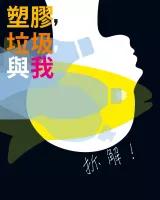Unpacked! Plastic, Waste, & Me!
Designed for young readers around the world, the book 'Find the Hidden Face! Plastic, Waste' and I answers 70 questions about plastic through colorful infographics and 6 real-life stories. Designer and author Gesine Grotrian, the design team of the Heinrich Böll Foundation, and the global Youth Advisory Board created an interesting non-fiction book for young people aged 12 and above.
Do you remember the 'plastic waste crisis' of 2018? Six years later, what are we doing to solve the problem of plastic waste? What should the world do to prevent the Earth from being filled with plastic waste?
The 5th session of the UN Plastics Convention (INC-5) was held in Busan, South Korea from November 25 to December 1, 2024 to solve the plastic waste crisis facing the Earth. Has the world found a solution to the problem of plastic waste? What binding agreement has been reached? Did the beginning of the plastic waste problem lead to a conclusion to reduce production?
Since 2019, the Heinrich Böll Foundation Earth Environment Report <Atlas> series Korean edition publication project has been carried out with 'Small is Beautiful'. In 2022, the world and Asian editions of <Plastic Atlas> containing global data and facts related to plastic were translated into Korean for the first time in Asia, revealing the reality of 'Plastic Earth'.
116 years since the introduction of plastic, we eat, wear, and live with plastic. Plastic waste is found everywhere on Earth, in cities and rural areas, mountains and oceans. Plastic that flows into the environment contaminates the natural ecosystem and returns to our bodies through our food tables. How did we end up living in a world overflowing with plastic? In recent years, plastic has been receiving much attention as a problem for everyone. Various meaningful movements, large and small, have taken place around the world to solve the plastic crisis.
《Plastic, Waste, and Me》 examines the complex and long process of plastic coming into our daily lives, from oil fields where plastic raw materials such as oil and natural gas are produced to plastic factories and supermarkets, where the ‘plastic life cycle’ begins, numerous types of plastic and problems with additives, and points out health, inequality, and climate problems caused by ‘disposable’ plastic. It shows the reality of the plastic crisis experienced by countries around the world, and the impact of plastic waste on humans, climate, nature, and wildlife. It also examines in detail the alternatives that have emerged as solutions to the plastic problem, and finds out what the real solution is to solve the plastic crisis.
It examines the true nature of the plastic problem encountered around the world, misunderstandings and truths, reflections and alternatives from the perspective of youth. This book is a ‘guide to finding the hidden truth about plastic’ designed for anyone interested in the plastic problem, including children and youth who are the future generation and those experiencing the plastic crisis.
The plastic crisis affects everyone, but not everyone is affected equally. The issues of justice and diversity are of particular interest in this book. Behind the plastic problem lies the attitude of capital that prioritizes profit, and the many layers of vested interests that affect the entire ecosystem.
This book answers 70 questions about plastic from the younger generation with easy-to-understand visuals and stories. It talks about the history of plastic, the concept of plastic, the production process, the reality of the plastic crisis in many countries, and the impact of plastic on the entire global ecosystem, and asks what to do now. For this book, young people around the world who are interested in the plastic problem gathered as a ‘Youth Advisory Committee.’ They gave their opinions on what they think about plastic, whether they are aware of the plastic problem, and whether the visuals introduced are easy to understand and appropriate.
To receive a physical copy of this book, or if you have any questions about the contents of this book, please email info@kr.boell.org.
